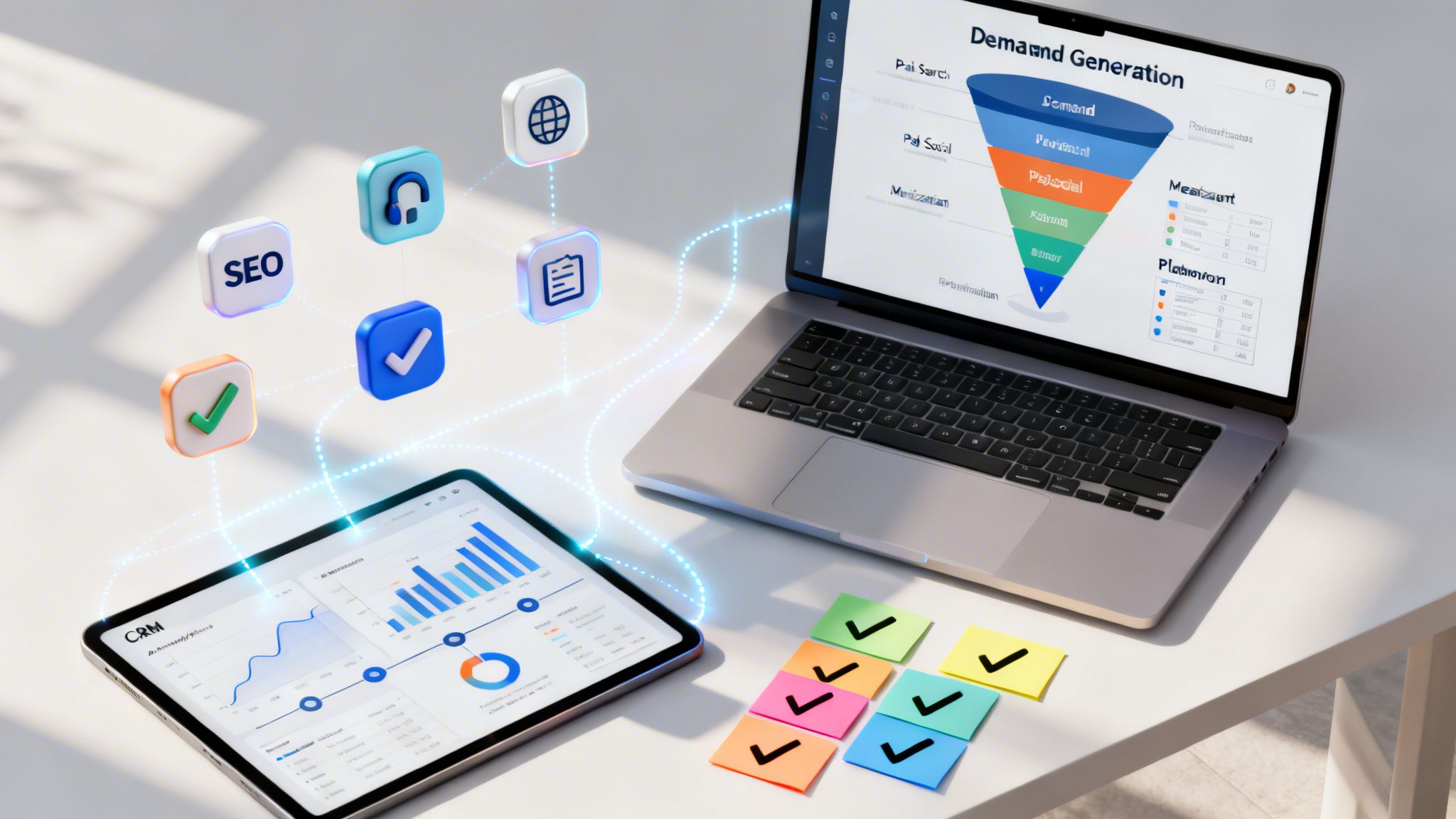In business, managing customer relationships efficiently is critical for the success of any company. Regardless of the type of industry your business is in, having an efficient system for managing customer interactions can be a game-changer. One such system is the Customer Relationship Management (CRM) system.
In this article, we will explore what CRM systems are and the numerous benefits they bring to various types of businesses, such as real estate, small businesses, insurance agencies, law firms, and travel agencies.
What Does CRM Stand For?
CRM stands for Customer Relationship Management. It refers to all tools, strategies, and techniques that companies use to manage and analyze customer interactions and data throughout the customer lifecycle. The aim is to enhance customer service relationships and assist in customer retention, driving sales growth.
A CRM system consolidates every bit of information from all customer touchpoints, which include the company's website, telephone, email, live chat, marketing materials, social media sites, and more. CRM software systems, also known as customer relationship management software, can provide employees with detailed information on customers' personal information, purchase history, buying preferences, concerns, contact details, and contact lists.
CRM for Real Estate
In the highly competitive real estate industry, having an effective CRM system can differentiate a successful business from an unsuccessful one. Real estate agents, sales teams, and marketing departments benefit immensely from CRM systems. They assist in:
- Organizing client information
- Tracking leads
- Managing client interactions
- Automating marketing efforts
- Managing the sales pipeline
With a real estate CRM, sales representatives can set reminders for client follow-ups, schedule property viewings, send personalized marketing materials, and monitor deals' progress. It also provides valuable data insights, allowing real estate professionals, sales managers, and marketing departments to make data-driven decisions, enhancing their efficiency and productivity.
RELATED: 5 Best CRM for Real Estate
CRM for Insurance Agents
CRM for insurance agents simplifies the tracking and management of insurance policies, claims, and clients' data. It enables insurance agents to automate routine tasks such as follow-ups, policy renewals, and claims processing.
CRM systems are invaluable to insurance sales teams, customer service representatives, and marketing departments as they enhance:
- Contact management
- Customer service relationships
- Sales process automation
- Sales forecasting
- Managing the sales pipeline
By providing comprehensive customer profiles, a CRM system assists insurance agents in delivering personalized interactions and quick response times to both current customers and prospective customers. This leads to increased customer satisfaction, improved customer retention, and ultimately drives sales growth.
CRM for Law Firms
In law firms, CRM systems play a pivotal role in maintaining a productive relationship with clients. They help attorneys and legal professionals to:
- Manage contacts
- Keep track of case details
- Organize appointments
- Manage deadlines
Additionally, CRM software provides an efficient platform to track billable hours, streamline the invoicing process, automate marketing efforts, and manage the sales pipeline. CRM systems enable law firms to identify potential clients, track sales cycles, manage marketing campaigns, and improve the customer journey. By offering personalized service based on comprehensive client profiles, law firms can significantly enhance client satisfaction and loyalty.
RELATED: 5 Best CRM for Law Firms
CRM for Travel Agencies
In the travel industry, where customer service is paramount, CRM systems are indispensable for travel agencies, customer support teams, and marketing departments. They help travel agencies in:
- Managing customer information
- Handling booking details
- Personalizing offers based on clients' preferences
CRM systems can automate communication with clients, send reminders for payments and travel dates, and provide alerts for changes in bookings or travel advisories. These functionalities help travel agencies offer top-notch service, increase customer satisfaction, promote repeat business, and adapt to the ever-changing demands of the industry.
RELATED: 5 Best CRM for Travel Agencies
CRM for Small Business

CRM systems are not exclusive to large corporations; small businesses and business owners can also leverage their capabilities. For small businesses, a CRM system can be a powerful tool to:
- Increase customer loyalty
- Generate repeat business
- Efficiently manage customer data
- Streamline business processes
- Better targeting and personalization
Moreover, it can help small businesses to track sales activities, identify potential customers, streamline marketing efforts, automate email campaigns, and automate repetitive tasks. This, in turn, improves sales efficiency, allows better communication within sales and marketing teams, and reduces the time spent on administrative tasks.
RELATED: 5 Best CRM for Small Business
CRM in a B2B Environment
CRM systems are not limited to B2C businesses; they are equally important in a business-to-business (B2B) environment. In B2B relationships, managing customer interactions and maintaining strong business relationships are crucial. A CRM system enables businesses to:
- Track interactions with potential customers
- Manage the sales pipeline
- Streamline sales cycles
- Automate email campaigns
- Utilize sales force automation
CRM systems provide a centralized platform for businesses to store and access important customer information, making it easier to nurture leads, close deals, and provide excellent customer service. With email integration and desktop tools, sales reps can seamlessly manage customer interactions and access a 360-degree view of their customers. This enables them to effectively manage sales leads and provide a superior customer experience.
Cloud Computing and CRM
In today's digital age, cloud computing has revolutionized the way businesses operate, and CRM systems have embraced this technology. Cloud-based CRMs offer numerous advantages, such as:
- Flexibility and scalability
- Accessibility from anywhere with an internet connection
- Data security and backup Integration with other software tools and systems
Cloud-based CRMs eliminate the need for businesses to invest in expensive infrastructure and maintenance costs. They provide a cost-effective solution for businesses of all sizes to leverage the benefits of CRM systems and access critical customer information anytime, anywhere.
RELATED: 5 Best CRM Tools for Business Development
Customer Data Platforms and CRM
In addition to CRM systems, businesses can utilize customer data platforms (CDPs) to further enhance their customer management efforts. CDPs collect and consolidate customer data from various sources, providing a comprehensive view of the customer across multiple channels and touchpoints.
Integrating a CDP with a CRM system allows businesses to unlock deeper insights into customer behaviors, preferences, and interactions, enabling more personalized and effective customer engagement.
The Array of Benefits from CRM Systems
CRM systems provide a wide range of benefits to businesses, especially to customer service teams. These systems enrich multiple facets of customer relationship management, from improved communication to effective management of sales opportunities. Here are some key advantages that CRM systems bring to the table:
- Streamlining customer communications: CRM tools equip customer service teams with the ability to streamline customer communications. This includes maintaining effective communication across various social media channels and managing email templates for consistent and professional interactions.
- Enhancing customer relationships: CRM systems store detailed consumer data, allowing businesses to anticipate customer expectations and cater to their individual needs effectively. As a result, this leads to stronger and more personalized relationships with customers.
- Efficient Process Management: Customer service teams can manage customer service processes more effectively using CRM systems. Tools such as pipeline management facilitate a seamless journey, from lead generation to conversion and customer retention.
- Personalized Support: CRM systems, with their detailed contact management tools, empower customer service representatives to provide personalized and efficient support throughout the entire customer journey.
- Sales Opportunities Management: CRM systems enable businesses to manage sales opportunities effectively. The sales staff can keep track of customer interactions across various channels and devise strategies accordingly.
- Optimization of Customer Experience: By integrating a centralized CRM system, businesses can optimize the customer experience. They gain access to valuable insights, which can shape their business strategy and improve customer service processes.
- Integration of Social Media Channels: CRM systems are not confined to managing direct interactions with customers; they can extend to handle communications over social media channels too. This integration allows businesses to track, manage, and respond to customer interactions across all platforms, creating a cohesive and comprehensive customer engagement strategy.
- Unrestricted Access to Customer Data: Access to customer data is no longer limited to customer service representatives. With CRM systems, the entire team - from sales to marketing to operations - can gain insights into customer preferences and behaviors. This accessibility can enable the team to work cohesively towards achieving customer satisfaction and business objectives.
- Optimization of Business Operations: CRM systems can streamline business operations by automating routine tasks and enhancing efficiency. Whether it's tracking sales opportunities, managing customer queries, or analyzing performance metrics, CRM systems provide the necessary tools and data for businesses to optimize their operations.
- Enhanced Team Collaboration: A centralized CRM system ensures that the entire team is on the same page. All customer-related data and interactions are accessible to the whole team, promoting better communication, reducing redundancies, and encouraging collaborative problem-solving.
- Building Long-lasting Relationships: A CRM system aids in building strong and long-lasting relationships with customers by providing a comprehensive view of the customer's interactions and preferences.
CRM systems are powerful tools that can transform how businesses manage their customer relationships. By streamlining processes, providing valuable insights through artificial intelligence, and enabling personalized service, CRM systems can significantly contribute to the growth and success of a business.
No matter the industry, a well-implemented CRM system, along with marketing automation tools, email tracking, and cloud-based CRMs or mobile apps, can offer tremendous benefits to sales teams, marketing departments, customer service representatives, and business owners. Understanding different types of CRM systems and their specific features is essential for businesses to choose the right solution that aligns with their needs and goals.
RELATED: 5 Best CRM for Startups
Finding Certified CRM Consultants and Developers
Twelverays is a leading digital marketing agency partnered with CRM companies such as Zoho and Hubspot, and offers services to assist businesses with their CRM implementation.
One of the key services provided by Twelverays is CRM implementation and consulting, where our team of experts helps businesses get started with CRM systems smoothly. We guide companies through the initial setup process and ensure all the necessary integrations are in place.
Twelverays also specializes in website development that is fully integrated with customer relationship management systems. We create responsive and user-friendly websites optimized for lead generation and customer engagement.
To ensure successful implementation, we also offer software training to businesses. Our team conducts comprehensive training sessions, equipping businesses with the knowledge and skills to effectively use CRM’s powerful tools and features.
With Twelverays by your side, your CRM system implementation will be smooth and efficient, enabling you to leverage CRM software capabilities and drive your marketing and sales success.
Book your discovery call today.





